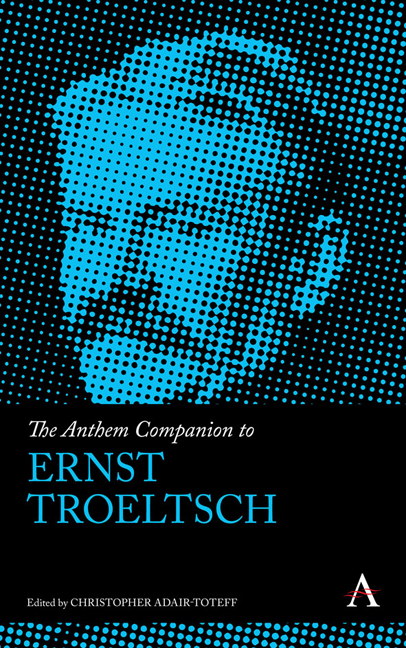Book contents
- Frontmatter
- Contents
- Introduction Ernst Troeltsch: Theologian, Sociologist, Philosopher, and Culture Critic
- Chapter One The Independence of Religious Phenomena: The Work of Ernst Troeltsch as a Template for the Study of Religion
- Chapter Two Troeltsch on Protestantism and Modernity
- Chapter Three Church, Sect, Mysticism: Writing the History of Christianity
- Chapter Four Troeltsch's Personalism
- Chapter Five Performative Practice: Ernst Troeltsch's Concept(s) of Christianity
- Chapter Six Troeltsch and the Problem of Theological Normativity
- Chapter Seven Troeltsch as Dogmatic Theologian
- Chapter Eight Ernst Troeltsch and the Problem of Historicism
- List of Contributors
- Index
Introduction - Ernst Troeltsch: Theologian, Sociologist, Philosopher, and Culture Critic
Published online by Cambridge University Press: 10 May 2018
- Frontmatter
- Contents
- Introduction Ernst Troeltsch: Theologian, Sociologist, Philosopher, and Culture Critic
- Chapter One The Independence of Religious Phenomena: The Work of Ernst Troeltsch as a Template for the Study of Religion
- Chapter Two Troeltsch on Protestantism and Modernity
- Chapter Three Church, Sect, Mysticism: Writing the History of Christianity
- Chapter Four Troeltsch's Personalism
- Chapter Five Performative Practice: Ernst Troeltsch's Concept(s) of Christianity
- Chapter Six Troeltsch and the Problem of Theological Normativity
- Chapter Seven Troeltsch as Dogmatic Theologian
- Chapter Eight Ernst Troeltsch and the Problem of Historicism
- List of Contributors
- Index
Summary
Ernst Troeltsch: Life and Work
The name Ernst Troeltsch is remembered mostly in two contexts: first as an important Protestant theologian, and second as a close colleague of Max Weber. There is much to support this view, but Troeltsch was much more than just a theologian and a colleague of Weber. He was also a sociologist, philosopher, and culture critic. The purpose of this introductory chapter is to indicate Troeltsch's importance as a theologian, a sociologist, a philosopher, and a critic of culture. I begin by providing a brief sketch of Troeltsch's life and work and conclude with an overview of recent editions of his work and of final comments.
Ernst Troeltsch was born on February 17, 1865, just outside Augsburg, Germany. His father was a physician, and his mother was a housewife. Troeltsch remembers that when he was a young boy his parents’ house was filled with medical books and instruments and he was encouraged to investigate natural phenomena as well as historical issues (1925b: 3– 4). He was educated first in Augsburg and then at the University at Erlangen. There he listened to lectures by Gustav Claß and learned about the importance of Immanuel Kant and Friedrich Schleiermacher, whose writings influenced Troeltsch's philosophical and theological thinking throughout his life. At the age of 20, Troeltsch transferred to Berlin where he studied under Julius Kaftan. But as much as he appreciated Kaftan's theology, he was far more impressed with Heinrich von Treitschke's politics (Drescher 1993: 18). In 1886, Troeltsch transferred to Göttingen. Not only did he want a town smaller than Berlin but also Albrecht Ritschl was there. From Ritschl, Troeltsch learned the importance of historical understanding of religion, and although he continued to respect Ritschl, he never really regarded himself as one of Ritschl's disciples. Troeltsch finished his education and began teaching at Göttingen, but he was to remain there only a short time. In 1892, he was called to Bonn as an “Extraordinarius” professor, and he distinguished himself so much that he was called to Heidelberg the following year. He stayed at Heidelberg from 1894 until 1915, and it was during this time that he published his major writings on Protestantism and the sociology of religion. It was also a period when he wrote on more philosophical topics and was involved in Baden politics.
- Type
- Chapter
- Information
- The Anthem Companion to Ernst Troeltsch , pp. 1 - 24Publisher: Anthem PressPrint publication year: 2017

